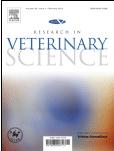
The objectives of this matched case-control study in a veterinary teaching hospital were to investigate the influence of signalment and historical data on the odds of occurrence of canine parvovirus (CPV) enteritis and the potential usefulness of the clinical signs and clinicopathologic abnormalities recorded on admission as prognostic indicators of mean duration of hospitalization (DOH) and outcome of the disease. Ninety-four puppies with natural CPV enteritis and 188 age-matched controls were studied. The odds to develop CPV enteritis were higher in purebreds compared to mixed-breed puppies. Vomiting and depression at the time of admission were associated with a prolongation of DOH by 2 and 1.75 days, respectively. The lymphopenic and hypoalbuminemic dogs were hospitalized for 1.9 and 2.5 more days, respectively, compared to those without these abnormalities. The odds of non-survival were higher in those puppies with evidence of systemic inflammatory response syndrome (SIRS) at the time of admission.